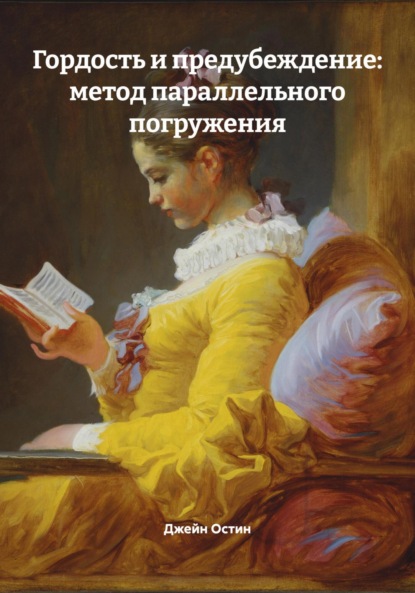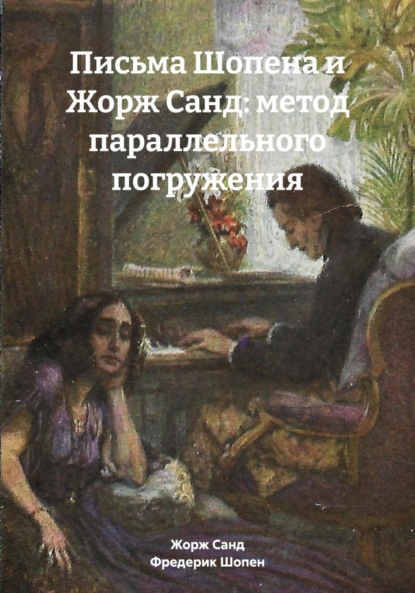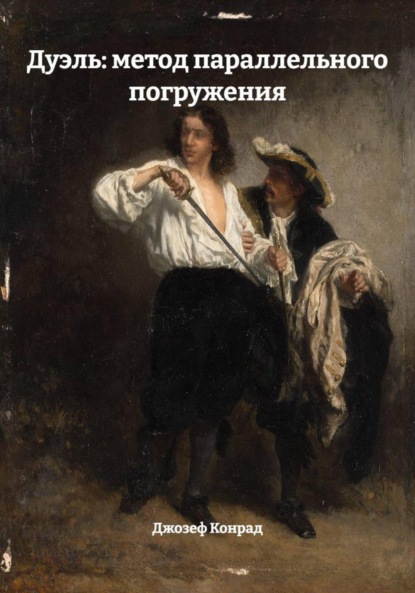Гордость и предубеждение: метод параллельного погружения

- -
- 100%
- +

CHAPTER I. (ГЛАВА ПЕРВАЯ.)
It is a truth universally acknowledged (это – истина, всеобщепризнанная; truth – истина; universally – всеобщо, повсеместно; acknowledged – признанная), that a single man in possession of a good fortune (что холостой мужчина, обладающий большим состоянием; a single man – неженатый мужчина; in possession of – владеющий; a good fortune – значительное состояние) must be in want of a wife (непременно должен нуждаться в жене; must be – должен быть; in want of – в нужде, нуждаться в; a wife – жена).
However little known the feelings or views of such a man may be on his first entering a neighbourhood (как бы мало ни были известны чувства или взгляды такого мужчины при его первом появлении в округе; however little known – как бы мало ни было известно; feelings or views – чувства или взгляды; such a man – такого мужчины; on his first entering – при его первом приходе; neighbourhood – соседство, окрестности), this truth is so well fixed in the minds of the surrounding families (эта истина столь прочно закреплена в умах окружающих семей; so well fixed – так хорошо укоренилась; in the minds – в умах; surrounding families – окружающие семьи), that he is considered as the rightful property of some one or other of their daughters (что он считается законной собственностью одной или другой из их дочерей; is considered – считается; rightful – законный; property – собственность; some one or other – той или иной).
CHAPTER I.
IT is a truth universally acknowledged, that a single man in possession of a good fortune must be in want of a wife.
However little known the feelings or views of such a man may be on his first entering a neighbourhood, this truth is so well fixed in the minds of the surrounding families, that he is considered as the rightful property of some one or other of their daughters.
“My dear Mr. Bennet,” said his lady to him one day («Мой дорогой мистер Беннет, – сказала ему однажды его супруга; said his lady – его жена сказала; one day – однажды), “have you heard that Netherfield Park is let at last?” (вы слышали, что наконец-то Нэзерфилд Парк сдан в аренду?; is let – сдан; at last – наконец-то).
Mr. Bennet replied that he had not. (мистер Беннет ответил, что не слышал; replied – ответил; he had not – он не слышал, не знал).
“But it is,” returned she («Но сдан, – ответила она; returned she – литературно: сказала она в ответ), “for Mrs. Long has just been here, and she told me all about it.” (ведь миссис Лонг только что была здесь и рассказала мне всё об этом; has just been – только что была; told me – рассказала мне; all about it – всё об этом).
Mr. Bennet made no answer. (мистер Беннет ничего не ответил; made no answer – промолчал).
“Do not you want to know who has taken it?” cried his wife, impatiently («Разве вы не хотите узнать, кто его снял?» – воскликнула его жена нетерпеливо; do not you want – разве не хотите; who has taken it – кто снял; cried – воскликнула; impatiently – нетерпеливо).
“You want to tell me, and I have no objection to hearing it.” («Вы хотите мне рассказать – и я не возражаю это выслушать; want to tell me – хотите рассказать мне; no objection – не возражаю; to hearing it – услышать это»).
“My dear Mr. Bennet,” said his lady to him one day, “have you heard that Netherfield Park is let at last?”
Mr. Bennet replied that he had not.
“But it is,” returned she; “for Mrs. Long has just been here, and she told me all about it.”
Mr. Bennet made no answer.
“Do not you want to know who has taken it?” cried his wife, impatiently.
“You want to tell me, and I have no objection to hearing it.”
This was invitation enough. (Этого приглашения было вполне достаточно; invitation – приглашение; enough – достаточно.)
“Why, my dear, you must know, Mrs. Long says that Netherfield is taken by a young man of large fortune from the north of England; («Ну, дорогой, ты должен знать: миссис Лонг говорит, что Нэзерфилд снят молодым человеком с большим состоянием с севера Англии; why – междометие: выражает удивление, нетерпение; my dear – дорогой мой; you must know – ты должен знать; is taken – занят, снят; a young man of large fortune – молодой человек с большим состоянием; from the north – с севера.) that he came down on Monday in a chaise and four to see the place, (что он приехал в понедельник в карете с четверкой лошадей, чтобы посмотреть место; came down – приехал из другого города; chaise and four – карета, запряжённая четырьмя лошадьми; to see the place – чтобы посмотреть поместье.) and was so much delighted with it that he agreed with Mr. Morris immediately; (и он был так в восторге от него, что сразу договорился с мистером Моррисом; so much delighted – так восхищён; agreed with – договорился с.) that he is to take possession before Michaelmas, (что он должен въехать до Михайлова дня; is to take possession – должен вступить во владение; Michaelmas – христианский праздник (29 сентября), часто использовался как срок аренды.) and some of his servants are to be in the house by the end of next week.” (и некоторые из его слуг должны быть в доме к концу следующей недели; servants – слуги; by the end of – к концу.)
This was invitation enough.
“Why, my dear, you must know, Mrs. Long says that Netherfield is taken by a young man of large fortune from the north of England; that he came down on Monday in a chaise and four to see the place, and was so much delighted with it that he agreed with Mr. Morris immediately; that he is to take possession before Michaelmas, and some of his servants are to be in the house by the end of next week.”
“What is his name?” («Как его зовут?»)
“Bingley.” («Бингли.»)
“Is he married or single?” («Он женат или холост?»)
“Oh, single, my dear, to be sure! A single man of large fortune; four or five thousand a year. What a fine thing for our girls!” («О, холост, дорогой, без сомнений! Холостой мужчина с большим состоянием; четыре или пять тысяч в год. Какое это чудо для наших девочек!; to be sure – конечно же; a fine thing – удача, везение.»)
“How so? how can it affect them?” («Почему это? Как это может повлиять на них?»; how so? – почему ты так думаешь?; affect – повлиять.)
“My dear Mr. Bennet,” replied his wife, “how can you be so tiresome? («Мой дорогой мистер Беннет, – ответила его жена, – как ты можешь быть таким скучным?; tiresome – утомительный, надоедливый.) You must know that I am thinking of his marrying one of them.” (Ты же должен понимать, что я думаю о том, чтобы он женился на одной из них; thinking of – думаю о; marrying – жениться.)
“Is that his design in settling here?” («Это его намерение, когда он сюда поселился?»; design – намерение, план; settling here – поселиться здесь.)
“Design? Nonsense, how can you talk so! («Намерение? Глупости, как ты можешь так говорить!; nonsense – чепуха, ерунда.) But it is very likely that he may fall in love with one of them, (Но вполне возможно, что он влюбится в одну из них; very likely – весьма вероятно; fall in love – влюбиться.) and therefore you must visit him as soon as he comes.” (и поэтому ты должен нанести ему визит, как только он приедет; therefore – следовательно; as soon as – как только.)
“What is his name?”
“Bingley.”
“Is he married or single?”
“Oh, single, my dear, to be sure! A single man of large fortune; four or five thousand a year. What a fine thing for our girls!”
“How so? how can it affect them?”
“My dear Mr. Bennet,” replied his wife, “how can you be so tiresome? You must know that I am thinking of his marrying one of them.”
“Is that his design in settling here?”
“Design? Nonsense, how can you talk so! But it is very likely that he may fall in love with one of them, and therefore you must visit him as soon as he comes.”
“I see no occasion for that. («Не вижу в этом никакой необходимости; I see no occasion – я не вижу повода / необходимости / причины.) You and the girls may go—or you may send them by themselves, which perhaps will be still better; (Ты и девочки можете пойти – или можешь послать их одних, что, возможно, будет даже лучше; may go – можете пойти; by themselves – одни, без сопровождения.) for as you are as handsome as any of them, Mr. Bingley might like you the best of the party.” (ибо ты так же хороша, как любая из них, мистер Бингли, возможно, выберет тебя самой привлекательной из всех; as handsome as – столь же красива, как; the best of the party – лучшей из компании.)
“My dear, you flatter me. («Дорогой, ты мне льстишь; flatter – льстить.) I certainly have had my share of beauty, but I do not pretend to be anything extraordinary now. (Уж я, конечно, имела свою долю красоты, но теперь не притворяюсь чем-то выдающимся; have had my share – получила свою долю; pretend to be – притворяться, выдавать себя за; extraordinary – необыкновенное.) When a woman has five grown-up daughters, she ought to give over thinking of her own beauty.” (Когда у женщины пять взрослых дочерей, ей следует перестать думать о собственной красоте; grown-up – взрослые; ought to – следует; give over – прекращать.)
“I see no occasion for that. You and the girls may go—or you may send them by themselves, which perhaps will be still better; for as you are as handsome as any of them, Mr. Bingley might like you the best of the party.”
“My dear, you flatter me. I certainly have had my share of beauty, but I do not pretend to be anything extraordinary now. When a woman has five grown-up daughters, she ought to give over thinking of her own beauty.”
“In such cases, a woman has not often much beauty to think of.” («В таких случаях у женщины, как правило, уже нет особой красоты, о которой можно было бы думать; not often much beauty – нечасто (остается) много красоты.)
“But, my dear, you must indeed go and see Mr. Bingley when he comes into the neighbourhood.” («Но, дорогой, ты действительно должен пойти и повидаться с мистером Бингли, когда он приедет в округу; must indeed – действительно должен; see Mr. Bingley – навестить мистера Бингли.)
“It is more than I engage for, I assure you.” («Это больше, чем я готов обещать, уверяю тебя; engage for – ручаться за, брать на себя; I assure you – уверяю тебя.)
“But consider your daughters. Only think what an establishment it would be for one of them. («Но подумай о своих дочерях. Только представь, какое выгодное устройство это было бы для одной из них; consider – подумай; establishment – здесь: выгодное замужество.) Sir William and Lady Lucas are determined to go, merely on that account; (Сэр Уильям и леди Лукас твердо решили пойти – исключительно по этой причине; are determined to – решительно настроены; merely on that account – только по этой причине.) for in general, you know, they visit no new comers. (ибо вообще-то, ты знаешь, они никогда не навещают новеньких; newcomers – новички, вновь прибывшие.) Indeed you must go, for it will be impossible for us to visit him, if you do not.” (В самом деле, ты должен пойти, ведь нам будет невозможно навестить его, если ты этого не сделаешь; indeed – в самом деле; it will be impossible – это будет невозможно.)
“In such cases, a woman has not often much beauty to think of.”
“But, my dear, you must indeed go and see Mr. Bingley when he comes into the neighbourhood.”
“It is more than I engage for, I assure you.”
“But consider your daughters. Only think what an establishment it would be for one of them. Sir William and Lady Lucas are determined to go, merely on that account; for in general, you know, they visit no new comers. Indeed you must go, for it will be impossible for us to visit him, if you do not.”
“You are over scrupulous, surely. («Ты чересчур щепетилен, несомненно; over scrupulous – слишком совестливый, чрезмерно щепетильный; surely – наверняка, несомненно.) I dare say Mr. Bingley will be very glad to see you; (Я полагаю, мистер Бингли будет очень рад тебя видеть; I dare say – осмелюсь сказать, думаю; very glad – очень рад.) and I will send a few lines by you to assure him of my hearty consent to his marrying whichever he chooses of the girls— (и я пошлю с тобой пару строк, чтобы заверить его в моем горячем согласии на брак с любой из девочек, которую он выберет; a few lines – несколько строк; to assure him – уверить его; hearty consent – горячее согласие; whichever he chooses – которую бы он ни выбрал.) though I must throw in a good word for my little Lizzy.” (хотя я должен замолвить словечко за мою Лиззи; throw in a good word – замолвить словечко.)
“I desire you will do no such thing. («Я хочу, чтобы ты не делал ничего подобного; I desire – я хочу, чтобы ты…; do no such thing – не делал этого.) Lizzy is not a bit better than the others: (Лиззи ничуть не лучше других; not a bit – ни капельки, ничуть.) and I am sure she is not half so handsome as Jane, nor half so good-humoured as Lydia. (и я уверена, что она не вполовину так красива, как Джейн, и не вполовину так добродушна, как Лидия; not half so … as – и вполовину не такая … как; good-humoured – добродушная.) But you are always giving her the preference.” (Но ты всегда отдаёшь предпочтение ей; giving the preference – отдаёшь предпочтение.)
“You are over scrupulous, surely. I dare say Mr. Bingley will be very glad to see you; and I will send a few lines by you to assure him of my hearty consent to his marrying whichever he chooses of the girls—though I must throw in a good word for my little Lizzy.”
“I desire you will do no such thing. Lizzy is not a bit better than the others: and I am sure she is not half so handsome as Jane, nor half so good-humoured as Lydia. But you are always giving her the preference.”
“They have none of them much to recommend them,” replied he: («У них ни у одной нет особых достоинств, – ответил он; none of them – ни у одной из них; to recommend them – в их пользу, рекомендовать их.) “they are all silly and ignorant like other girls; (они все глупы и невежественны, как и другие девушки; silly and ignorant – глупы и невежественны.) but Lizzy has something more of quickness than her sisters.” (но у Лиззи больше живости ума, чем у её сестёр; quickness – живость, сообразительность.)
“Mr. Bennet, how can you abuse your own children in such a way? («Мистер Беннет, как вы можете так дурно отзываться о своих собственных детях?; abuse – оскорблять, пренебрежительно отзываться.) You take delight in vexing me. (Ты находишь удовольствие в том, чтобы меня раздражать; take delight in – получать удовольствие от; vex – досаждать, раздражать.) You have no compassion on my poor nerves.” (Ты не испытываешь никакого сострадания к моим бедным нервам; no compassion – ни капли сочувствия.)
“You mistake me, my dear. («Ты меня неправильно понимаешь, дорогая; you mistake me – ты ошибаешься на мой счёт.) I have a high respect for your nerves. (Я глубоко уважаю твои нервы; high respect – глубокое уважение.) They are my old friends. (Они мои старые друзья.) I have heard you mention them with consideration these twenty years at least.” (Я слышал, как ты упоминаешь их с уважением как минимум последние двадцать лет; mention with consideration – упоминать с вниманием, уважением.)
“Ah, you do not know what I suffer.” («Ах, ты не знаешь, как я страдаю; what I suffer – что я переношу, как мучаюсь.)
“They have none of them much to recommend them,” replied he: “they are all silly and ignorant like other girls; but Lizzy has something more of quickness than her sisters.”
“Mr. Bennet, how can you abuse your own children in such a way? You take delight in vexing me. You have no compassion on my poor nerves.”
“You mistake me, my dear. I have a high respect for your nerves. They are my old friends. I have heard you mention them with consideration these twenty years at least.”
“Ah, you do not know what I suffer.”
“But I hope you will get over it, («Но я надеюсь, ты с этим справишься; get over it – преодолеть, справиться.) and live to see many young men of four thousand a year come into the neighbourhood.” (и доживёшь до того, как много молодых людей с доходом в четыре тысячи в год приедут в округу; live to see – дожить до того, чтобы увидеть; four thousand a year – четыре тысячи в год; come into the neighbourhood – приедут в округу.)
“It will be no use to us, if twenty such should come, since you will not visit them.” («Это не принесёт нам пользы, даже если приедут двадцать таких, раз ты не пойдёшь с ними знакомиться; no use to us – бесполезно для нас; should come – если (вдруг) приедут; since – поскольку.)
“Depend upon it, my dear, that when there are twenty, I will visit them all.” («Можешь быть уверен, дорогая, что когда их будет двадцать – я навещу их всех; depend upon it – можешь быть уверен; visit them all – навещу всех.)
“But I hope you will get over it, and live to see many young men of four thousand a year come into the neighbourhood.”
“It will be no use to us, if twenty such should come, since you will not visit them.”
“Depend upon it, my dear, that when there are twenty, I will visit them all.”
Mr. Bennet was so odd a mixture of quick parts, sarcastic humour, reserve, and caprice, (Мистер Беннет был таким странным сочетанием живого ума, язвительного юмора, сдержанности и капризности; odd – странный; a mixture of – сочетание; quick parts – живость ума; reserve – сдержанность; caprice – капризность.) that the experience of three-and-twenty years had been insufficient to make his wife understand his character. (что даже двадцатитрехлетний опыт совместной жизни оказался недостаточным, чтобы его жена поняла его характер; three-and-twenty years – 23 года; insufficient – недостаточным; to make someone understand – заставить кого-то понять.) Her mind was less difficult to develope. (Её ум было легче разгадать; less difficult – менее трудный; to develope – раскрыть, понять.) She was a woman of mean understanding, little information, and uncertain temper. (Она была женщиной со скудным умом, малой осведомлённостью и неуравновешенным характером; mean understanding – посредственный ум; little information – малая осведомлённость; uncertain temper – переменчивый нрав.) When she was discontented, she fancied herself nervous. (Когда она была недовольна, ей казалось, что у неё расшатанные нервы; discontented – недовольна; fancied herself – воображала себя.) The business of her life was to get her daughters married: (Главной задачей её жизни было выдать дочерей замуж; business of her life – дело всей её жизни.) its solace was visiting and news. (её утешением были визиты и новости; solace – утешение, отрада.)
Mr. Bennet was so odd a mixture of quick parts, sarcastic humour, reserve, and caprice, that the experience of three-and-twenty years had been insufficient to make his wife understand his character. Her mind was less difficult to develope. She was a woman of mean understanding, little information, and uncertain temper. When she was discontented, she fancied herself nervous. The business of her life was to get her daughters married: its solace was visiting and news.
CHAPTER II. (ГЛАВА ВТОРАЯ.)
MR. BENNET was among the earliest of those who waited on Mr. Bingley. (Мистер Беннет был одним из первых, кто нанес визит мистеру Бингли; among the earliest – среди первых; waited on – нанес визит, посетил.) He had always intended to visit him, (Он с самого начала намеревался навестить его; had intended – намеревался; to visit – навестить.) though to the last always assuring his wife that he should not go; (хотя до последнего уверял свою жену, что не пойдет; to the last – до последнего момента; assuring – уверяя; should not go – не пойдет.) and till the evening after the visit was paid she had no knowledge of it. (и до самого вечера после того, как визит был нанесен, она об этом не знала; till the evening – до вечера; visit was paid – визит был совершен; had no knowledge – не имела представления.) It was then disclosed in the following manner. (Это было раскрыто следующим образом; disclosed – раскрыто, стало известно; in the following manner – следующим образом.) Observing his second daughter employed in trimming a hat, he suddenly addressed her with,— (Увидев, что его вторая дочь занята отделкой шляпы, он внезапно обратился к ней со словами; observing – заметив, увидев; employed in – занята чем-то; trimming – отделкой, украшением.)
CHAPTER II.
MR. BENNET was among the earliest of those who waited on Mr. Bingley. He had always intended to visit him, though to the last always assuring his wife that he should not go; and till the evening after the visit was paid she had no knowledge of it. It was then disclosed in the following manner. Observing his second daughter employed in trimming a hat, he suddenly addressed her with,—
“I hope Mr. Bingley will like it, Lizzy.” («Надеюсь, мистеру Бингли понравится, Лиззи.»)
“We are not in a way to know what Mr. Bingley likes,” said her mother, resentfully, («У нас нет возможности узнать, что нравится мистеру Бингли, – сказала её мать с обидой; not in a way to know – не можем узнать; resentfully – с обидой, раздражённо.) “since we are not to visit.” («так как мы с ним не собираемся знакомиться; are not to visit – не должны / не собираемся навещать.»)
“But you forget, mamma,” said Elizabeth, («Но ты забываешь, мама, – сказала Элизабет,) “that we shall meet him at the assemblies, and that Mrs. Long has promised to introduce him.” (что мы встретим его на балу, и что миссис Лонг обещала представить его; assemblies – собрания, балы; has promised – пообещала; to introduce – представить.)








